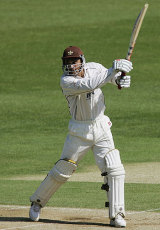Mark Ramprakash
Rob Steen
|
|

|
"You look like a mesmerising matinée idol," judge Arlene Phillips gushed after one of Mark Ramprakash's turns on Strictly Come Dancing in the autumn of 2006. Given those handsome features and the deft footwork he brings to his day job, his victory in the BBC's celebrity ballroom show (inheriting the title won in 2005 by Darren Gough) seemed inevitable.
This made a contrast with his cricket. No one imagined that he would finish his Test career (as now seems virtually certain) with the unworthy average of 27.32. But with that avenue closed, he spent the pre-dancing part of 2006 giving himself, aged 36, an extraordinary Indian summer with Surrey, smithereening a number of seemingly invincible first-class records. It was more tempting than ever to wonder what might have been, had the dedication, technique and passion of his tempestuous younger self been underpinned, at national level, by a sense of belonging - which he might have had, if central contracts had been introduced earlier.
While his successors in the England team wavered, Ramprakash proceeded with utter certainty. Taking 20 innings to reach 2,000 runs for the season, he outsprinted Bradman and Gooch; he hit 150s in five consecutive games, surpassing Vijay Merchant's 65-year-old streak; his average of 105.28 was the sixth-highest ever attained in a County Championship summer by a player passing 1,000. Had he not sat out two fixtures he might even have usurped another Bradman untouchable: the English-season peak of 115.66.
Were his runs devalued by being made off second-division bowlers? Only if the likes of Mohammad Asif, Zaheer Khan and Andy Caddick are your concept of donkeys. It all stemmed, moreover, from a tip by the Australian coach Mark O'Neill, to start his "trigger movements" an instant earlier. Some old dogs can learn new tricks. And not just new dance steps.
In any other summer Mushtaq Ahmed's 102 wickets, the struts and beams of Sussex's Championship triumph, would have dominated the gong ceremonies, yet Ramprakash's peers, the Professional Cricketers' Association, voted him their player of the year. Just a year earlier, after an abysmal 2005 season that saw Surrey relegated, mainly under his captaincy, he had published a diary, Four More Weeks, a tasty if unsavoury dish of dressing-room schisms sautéed in lies over ball-tampering. The rollercoaster always was his second home.
|
|
Sportswriters feel protective of those they spot early, less charitable to those who disappoint them. Born on September 5, 1969, in Bushey, Hertfordshire, to an Irish mother and a father who had emigrated from Guyana, Mark Ravin Ramprakash fits into both categories. Those at Lord's who saw his coolly assertive debut for Middlesex in 1987, when he was still at sixth-form college, invoked Denis Compton. A year later, still 18, he won the match award in the NatWest final, scoring a matchwinning 56, "batting throughout in his cap," said Wisden, "with confidence, style and a rare charm." That remains, poignantly, his favourite professional memory: "I was so young, so untouchable."
Expectation weighed heavy. "In 1989 I made just under 1,000 Championship runs at 35. I got a lot of criticism; I thought I'd done all right." He had too. Two years later, England threw him in, aged 21, against Ambrose, Patterson, Walsh and Marshall at Headingley. He believes that would never happen now. These things rankled. Only once did he experience any racist abuse, but he admits: "I never found it that easy to take stick from crowds, to let it go over my head the way Mike Gatting did."
He passed 20 seven times in that maiden series without reaching 30. The pattern was set: immaculate from first gear to third, but with poor acceleration and occasional fits of road rage. That England dressing-room, unhelpfully, was already riddled with insecurity; Graeme Hick, who made his debut in the same Test, was another victim. "There were a lot of casualties, a lot of one-cap wonders," reflects Ramprakash. "It's the luxury of having 18 first-class counties: the selectors probably gave in too quickly to the claims of alternative candidates."
Seldom did he have the luxury of a settled position, batting everywhere from No. 2 to No. 7. Not until Bridgetown 1997-98, in his 38th innings, did he scale three figures. There was no logical pattern: half his 14 Test fifties - including his only other century - came against Australia, against whom he averaged 42; his 13 innings at Lord's, the square he knows best, brought five ducks, a ground record.
|
|
At odds with John Buchanan during his brief and turbulent reign as county coach, Ramprakash endured a torrid time as Middlesex captain between 1997 and 1999. In 2001 he crossed the Thames, partly to play in the first division (relegation in 2005 was not in the script), partly in despair at what he considered Middlesex's lack of ambition. Joining a star-laden Surrey team was "the best decision I've ever made". The pressure, crucially, "was not all on me, which helped me relax and express myself ".
He did well in the 2001 Ashes, when England as a whole didn't, including a century when the team were crushed at The Oval. But after a poor tour of New Zealand, the selectors decided to look elsewhere. County bowlers paid the price: the three seasons prior to 2006 yielded Championship averages of 68.83, 60.45 and 74.66.
He is now 13 short of becoming the 25th player to harvest a century of centuries - and quite possibly the last. Not a bad way for a perceived underachiever to sign off.

